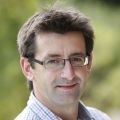 Mark Woolrich is the Director of the Oxford Centre for Human Brain Activity (OHBA)
Mark Woolrich is the Director of the Oxford Centre for Human Brain Activity (OHBA)
Tell us a little about yourself, and what attracted you to studying/working at the University of Oxford?
I did an Engineering Science undergraduate degree at the University of Oxford in the mid 90s. After a few years working for IBM, I came back to do a doctorate in Biomedical Engineering, and I have been here ever since! So, I should probably thank (or blame) Prof. Mike Brady who, through his undergrad Engineering lecture course, inspired me to come back to Oxford and do research.
What is your vision for the team/research you work with?
We develop computational methods that allow new questions to be asked about the brain using neural recordings (fMRI, MEG, EEG etc.). In practice, we build mathematical models of the data and use Machine Learning to infer on them, particularly from a Bayesian perspective. Nowadays, we just say we work on Artificial Intelligence, to try and make it all sound more impressive. One aim is to develop individualised and detailed descriptions of the dynamics of brain networks, and use them to inform fundamental and clinical neuroscience.
What is currently at the top of your To-Do List?
To find a replacement for our linchpin OHBA manager Sarah Clayton who is leaving us in August. Without all the support from core staff, things would soon fall into disarray!
How did you get to where you are today?
A lot of luck, serendipity, and support from my family. I was very lucky to join FMRIB near its inception and be involved in the creation of the MRI analysis toolbox, FSL, thanks to Prof. Steve Smith. Then, Prof. Kia Nobre recruited me to run the analysis group at OHBA and work more on electrophysiological data, which has proven to be an inspiring challenge.
Who or what inspires you?
From a young age, I have always enjoyed striving to understand maths, technology and science. My oldest children have now stopped asking me for help with their homework because apparently, I am “too enthusiastic” and tend to “go off on one”. Scientific research gives you the chance to scratch that kind of itch.
If you were not in your study programme/job currently, what would you like to be doing?
Perhaps I would look after my three kids for half the week. The other half, I don’t know, perhaps working in some sort of technical/scientific spin-off company.
What to read next
60 Seconds with...Verity Westgate
15 May 2023
60 Seconds With...Raihaan Patel
6 April 2023
60 seconds with...Laura Winchester
14 February 2023


